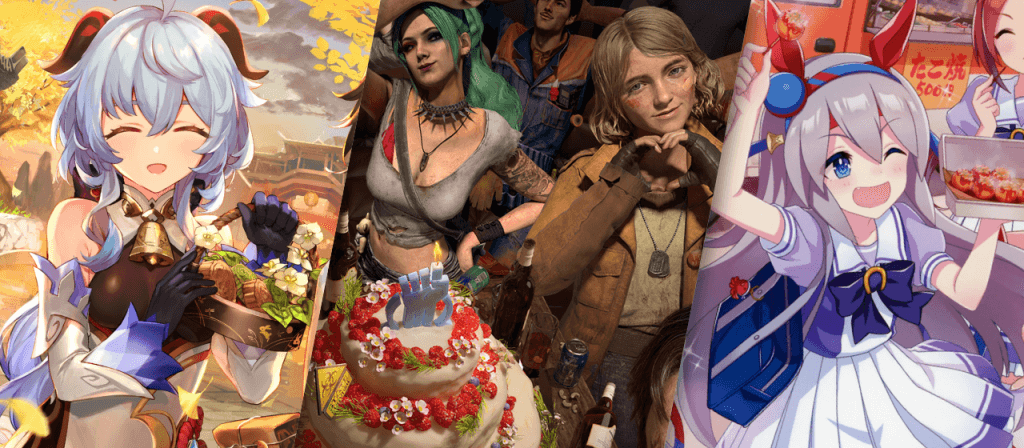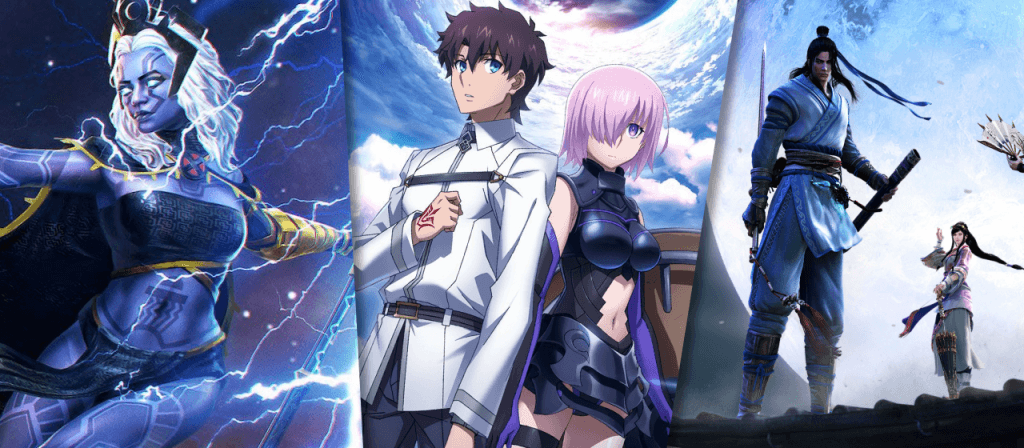In this episode, GameRefinery looks at the craziest events this year, from Genshin Impact’s collab with KFC to Roblox Lil Nas X digital concert.
GameRefinery Analysts Kalle Heikkinen and Wilhelm Voutilainen join host Jon Jordan to discuss the wonderful world of mobile game events, including the mechanics behind LiveOps and utilizing the same framework for multiple events, the benefits of collaborating with non-gaming brands and the importance of seasonal events to the success of mobile games.
You’ll find the latest episode on YouTube and all major podcast platforms.
Watch the episode on YouTube:
Or listen to it through BuzzSprout:
We’re available on all major podcast platforms – if you enjoy the episode, remember to hit subscribe!
Topics we will cover in this episode:
- Seasonal event trends in the West
- Not all seasonal events are created equal
- Collaboration events are getting more and more common in West
- The all-time champion of food-collabs in Asia: KFC
- Asian seasonal events
Introduction
Jon: Hello, and welcome to the Mobile Game Dev Playbook. Thanks for tuning in for another episode. This is a podcast all about what makes a great mobile game, what is and isn’t working for mobile game designers and all the latest trends. I’m your host Jon Jordan and joining me today in this episode to talk about LiveOps, and seasonal events and collaborations and all such sort of mashups, we have our two experts. First up, we have Kalle Heikkinen, a senior game analyst at GameRefinery by Vungle, an expert in the Chinese market. How’s it going, Kalle?
Kalle: Very good. Thanks for asking. How about you?
Jon: Yes, good. We’re all getting ready for seasonal things, we’re in the particularly seasonal part of the year, so I think it’s just going to be a good episode looking at those sort of things, and also joining us we have Wilhelm Voutilainen who’s the senior game analyst also at GameRefinery by Vungle and particular expert on the US marketing. How’s it going, Wilhelm?
Wilhelm: Yes. I’m doing really well. Thank you for asking.
Jon: We’re going to cover a bit of ground, we’re going to look at– Generally this is seen as sort of live operations, how these mobile games that have been going for now maybe up to a decade, how they’re keeping their audiences sort of reengaged and coming back and special events are a massive part of that and I guess particularly as we say, seasonal events are a really good way of getting these fantasy games worlds in some places linked into the real world and getting people excited about these things. We’re going to talk a bit about the difference between Asia and the West, but you’re going to kick us off talking about the western markets, and how seasonal events are playing into what’s going on in the market at the moment. What’s going on?
Seasonal event trends in the West
Wilhelm: Yes. In the western market, of course, they are currently highly popular when talking about seasonal events. I think about 90% of top-grossing 100 games in the US utilize some kind of seasonal event. Also, looking at what kind of difference, of course, because there’s a lot of different kind of seasonal events you can use, Christmas, New Year, and so on, but many of these top-grossing games actually take the opportunity, utilize almost all of these bigger seasonal events. They have events for Christmas, events for Halloween, for summer, and so on.
We have also been seeing huge rise in the smaller events as well, for example, Oktoberfest, midsummer, and so on. The smaller events have been gaining popularity each year. Then when looking at the event structure and what kind of seasonal events usually actually are, they have been varying from all the way from just small UI team changes. You have a seasonal team in the UI all the way from that to this huge fully-fledged event with special tasks, event currencies, limited-time content like seasonal game modes, and pretty much always when there’s a bigger event, you have these exclusive seasonal team rewards.
Also, one of the biggest trends in seasonal events, in terms of the bigger events in general, has been utilizing this same kind of event framework throughout the whole year for all the events. You have the usual mechanics in the event and then just change the scheme from, let’s say there is a Christmas event, and then you have Easter event. It’s basically the same event, just new rewards and a new team and maybe new story elements and so on. I think this is quite clever in terms of event rules. Everything is already familiar to the player, but also because there is LiveOps and running as many events as possible has been really proven and working well in mobile games. Of course, there are also limitations with LiveOps, so this is a clever way to enable this utilization of multiple if not every single seasonal event there is.
“One of the biggest trends in seasonal events has been utilizing this same kind of event framework throughout the whole year for all the events. It’s the same event, just new rewards and a new team and maybe new story elements.”
Wilhelm on the use of the same mechanics across different events
Jon: Yes, those are some good points. Okay. I guess the first one was– I’m surprised it’s only 90% of the top 100 grossing games are using seasonal events. I was trying to think what would be the games that wouldn’t use seasonal events. Why would you not do this? It’s sort of surprising that you have this successful game that isn’t using in some ways. I guess there could be some reasons. I don’t know if there’s anything off the top of your head why you wouldn’t do that.
Assuming that games are using seasonal events, it’s sort of interesting that LiveOps is always having something new in the game, isn’t it? Some of those things will be seasonal events, some of those things will just be sort of the cadence of the game, and you have new character drops which have nothing to do with what’s going on in the real world. Still, as you say, you always want something new happening, and the LiveOps team gets that framework in and then, to a degree, sort of putting in skins, but in some ways, it could be bigger things.
Do you think there can be too much LiveOps? There is this idea that you always want some new things in there, so people do not feel like the game’s going stale. There’s the game they’re playing and the meta they’re doing in the game, and there are these new things. Can it be too confusing, do you think, if we have too much going on, if you just load the game and just like, “Whoa, what’s it,” every time you have to work out what the new thing is?
Wilhelm: Yes. It can be confusing, and maybe the synergies are not there if there are too many events happening simultaneously. Still, I think what’s important, even in the casual genres, the most interesting point is that there is some kind of event almost always going on, that they don’t overlap too much. I think that’s the important thing you have to remember.
Kalle: I think that’s a very good point.
Jon: You can go ahead, Kalle.
Kalle: Yes, for certain players, they might be overly stressed, especially those completionists, if they’re not able to complete all the event content that is available in the game and there’s too much of the event stuff to do, and they get anxious about not being able to just experiencing all the content and getting, for example, all the limited-time items or characters or character skins that would be available to get so I can think that for certain players it might even be a stressful thing to have.
“For certain players, they might be overly stressed, especially those completionists, if they’re not able to complete all the event content that is available in the game and there’s too much of the event stuff to do.”
Kalle on the negative reaction from players if too many events run at the same time
Not all seasonal events are created equal
Jon: I agree. Also, games are global, and even if some games mainly have geographical popularity, most games are played globally now. Interestingly, there are probably some season events that perhaps do work globally better than others. Christmas or a holiday season around in December roughly works globally because, in the West, we have it. In China, you have New Year, a bit into January, but we have that sort of month period where everyone celebrates that sort of thing, so that’s quite a good one.
The other one I was thinking of was; I don’t know how global it is; maybe you can talk about this Kalle is Halloween seems to be one that culturally is now very strong. It plays in quite well with games, doesn’t it? Because of lots of games, Halloween would be something that they would pick up upon. If games were going to invent their own seasonal thing, Halloween would probably be the one they would go for because everyone immediately knows it. Is that very strong in Asia, Halloween?
Kalle: In general, Halloween is a thing in Japan, like even outside games; it’s huge. If you happen to be in Tokyo during Halloween, everyone wears a costume and goes outside to party on Halloween, so it’s a huge thing. In terms of games, I believe it’s utilized to some extent in terms of games, but I would still say that in these Asian markets, for example, Japan and China, the most important seasonal event you see in the games are the local ones. Some events have a more global reach, Halloween is probably one of them for sure, but if we are thinking about the biggest events, they would probably be some of the ones that we are not that familiar with in the West, but yes, I guess I’ll discuss them later on.
Jon: Equally, over time, particularly the games that are developed in Asia when they’re doing their big season events, that leaks into the Western audience, and we start to learn a bit more about those cultures and the sort of things that are important to them which is also interesting.
Kalle: Yes, that’s true; that’s something that we have noticed when we compare the games in the Asia markets and the Western Markets. Our Western market analysts have sometimes said that, hey, we have these Lunar New Year events in Western games also. So true.
Jon: If you have any Chinese audience, the Chinese New Year will always be the year of whatever animal it is. It will be something that will be seen as quite common for you to reflect in the game, wouldn’t it? What do we think about things like, you mentioned it there Wilhelm, like Oktoberfest, which is quite a– And obviously in the West I suppose, in Europe we’ve seen that spread over time, that people have this sort of idea of German beer and sausage sort of month or something like that?
Can we have events that are tuned to a smaller audience, or is Oktoberfest something that you know is quite a good one because even if you didn’t know what an Oktoberfest is if you’re in Australia, it doesn’t matter, you can sort of understanding, it’s just a gaming event around something, and it doesn’t matter? Do these events need to have resonance for the audience?
Wilhelm: Let’s say, for example, you have a game that has to have– You want to have events every single month, and during the Oktoberfest, just before Halloween, you think, “Ok, what kind of event do we want to have, what kind of theme do we want to have for our event this month?” You can come up with some kind of event theme from your game, utilizing– Of course, not everybody is super familiar with what Oktoberfest is. However, I think most people have still heard about it, so seeing some kind of family or Oktoberfest in your game, I think it’s something that the games have been utilizing —talking about Oktoberfest and these smaller, more seasonal events like Oktoberfest that aren’t usually like this. Anything super new in the game is just that you know that Oktoberfest skin is on top of your regular monthly event with some Oktoberfest themed things. That’s been really popular, the Oktoberfest as well in the games.
Jon: One thing that I have noticed in games, particularly around Christmas, generally mid-December on the Main Menu it gets a snow theme or something, or red Santa Claus hats and stuff. I have found in previous years that while games are quite keen on getting in early to these significant seasonal events, they can still be in mid-January, and you’re still in sort of Christmas theme; maybe it’s just all my thing, but I think, “Oh that’s–,” that seems like they’ve forgotten to update the game. We’re on the 15th of January, and everyone’s like, “Oh, it’s a New year,” and we’re still on a Christmas theme. How quickly do you think these things– because you haven’t been there too long, they’ve become the opposite of what they’re supposed to be, which is keeping the game fresh. They become a bit tired. Everyone’s stopped Christmas, and the game is still Christmassy.
Wilhelm: Yes. Pretty much every game has some kind of Christmas theme running event, and then, of course, you have the New Year, but usually, after that, the most common seasonal event is this winter event for January. That’s usually what the games do in the West.
Jon: Yes. They can keep the snow and just take away the Santa Claus hats. Maybe that’s the compromise. We talked a bit about seasonal events in the West; we’ll talk about China later. The other thing which is sort of linked in terms of LiveOps is we see increasing amounts of collaboration, and those are collaborations between brands typically. The ones that come to mind are collaborations between games and non-gaming brands, and, as games get bigger and brands want to market to those audiences, we see a lot more of that, so what trends do you see from that?
Collaboration events are getting more and more common in West
Wilhelm: Yes, the first trend is, of course, the collaboration itself becoming extremely popular, especially in these games that have heavy LiveOps in the mid-core category, for example, but like some really good examples, of course, it depends on the game, what event is and what brands they collaborate with, but for example one of the biggest games that use collaborations is Roblox.
I think that’s a perfect example. For their events, I think most of them, like nine out of the ten different events that they run in the game, is some kind of collaboration. For example, they collaborated with– they often have these concert events where different artists do their album releases inside the Roblox, in this weird world experience. Hence, they just had one with Twenty One Pilots, and of course, before that, they’ve had with Zara Larson and Lil Nas X also.
“For Roblox’s’ events like nine out of the ten different events that they run in the game is some kind of collaboration.”
Wilhelm on Roblox collaboration events
On top of that, while they had the Twenty One Pilots experience, they also had at the same time, they did with the collaboration with Vans, so a whole other collaboration, what they did actually, they created this huge Vans game inside Roblox, where you get this Tony Hawk pro skater feeling because it’s a hang out social area where players can skate. It’s basically a permanent game inside Roblox with Van’s team, and players can purchase Vans items and skateboards and what else to their character, so those are like really good examples, and also, actually, a mobile called mobile legend; bang bang. We have seen because I could talk about this and go deep about this. Still, mobiles are probably one of the most challenging genres to monetize because they have to rely heavily on the cosmetic economies to avoid paying to win.
How Mobile Legend: Bang Bang has been able to monetize extremely well is through these collaboration events. They just had, for example, a collaboration event with Transformers, where there was like these super cool exclusive skins the player could use for their favourite heroes, like Optimus Prime and those, and how players could get them is basically through these special gachas. There are so many possibilities utilizing collaboration events, like the exclusive characters are just one, right extremely good example.
“Mobiles are probably one of the most challenging genres to monetize because they have to rely heavily on the cosmetic economies to avoid paying to win.”
Wilhelm on monetizing events in mobile games
Jon: I guess again, it all comes back to the bit discussing with the LiveOps things is I think it’s finding the balance of, if like every week there’s a new collaboration, then it’s like yes, quickly they’re not special and obviously, some collaborations are just with more prominent brands than others, so it’s an interesting, cadence how you play that out, because yes, and again, it’s going back to what you said Kalle a little bit if you have too many collaborations, and they feel like they’re just being, oh, I’ve going to spend more money to get these things, again it’s a difficult balancing act. The Roblox one, I guess, is easier because it is just —
Wilhelm: A huge meta world game.
Jon: Yes, and events you’re not paying for anything, you’re just turning up to do it, and there may be things to buy around that, but the reason you’re going for that and the ones in Fortnite is that you’re there, it’s the live experience which is, I guess an interesting, almost like in-between collaboration and seasonal thing. It’s not seasonal in that sense, but it’s live events in games. I think most games can’t sustain that technically, but over time, we’ll see more and more of that appointment gaming or whatever term we want to use where you get all your audience in to see this new thing.
Kalle: I think that’s a very good point, and like I would argue that the collaboration events, they work better in some games and worse in some other games, especially like in those like Fortnite and Roblox which are these social hangouts things are a huge part of the overall experience, and then that enables you to create this huge hype for example with the concerts and the stuff that you have coming up with the collaboration event. I think utilizing collaborations with the game mechanics that they have in these types of games. I think it was a very good point, Jon, that you mentioned the seasonality of things because I think these games are also utilizing that to some extent; for example, the Fortnight just had Ariana Grande thing. It lasted for several other weeks and had several different phases for– In phase one, you have these quests; in phase two, you have these quests. Hence, it was like a multiple-week extravaganza with Ariana Grande event.
“I would argue that the collaboration events, they work better in some games and worse in some other games, especially like in those like Fortnite and Roblox which are these social hangouts things are a huge part of the overall experience.”
Kalle on how collaboration events work well in some games and not others
Jon: That was so elaborate, wasn’t it? Say the build-up to it, and the actual event itself was– There’s only probably only a handful of companies in the world even if they had this sort of game which you could do that event who would be able to spend the resources. I don’t know how many they’ve had been working on that. But clearly, they are building a fairly substantial game within a game too– I wonder if it’s– Then, the problem many, I guess, becomes– The next big event they do is, “We did that last time? How are you going better?”
It almost becomes diminishing returns that you’re putting so many resources into these completely over-the-top experiences, which are fantastic, but how do you do that without competing with yourself every time? How can you do that in a way that fulfils your audience’s excitement and desires but doesn’t blow your budget? I suppose Epic don’t care. That’s part of the thing of Epic saying we’re the top developer for lots of reasons in this space, so maybe they don’t care less about it. I guess what we’re thinking in this podcast is just for general game developers who necessarily don’t have a lot of resources. They’re thinking about, “I’ve got a certain amount of resources; where do I place that?” It’s finding a balance between these enormous great events–
“It almost becomes diminishing returns that you’re putting so many resources into these completely over-the-top experiences, which are fantastic, but how do you do that without competing with yourself every time? How can you do that in a way that fulfils your audience’s excitement and desires but doesn’t blow your budget? I suppose Epic don’t care.”
Jon on Epic’s enormous budget for events
Wilhelm: I think we already discussed utilizing the same event framework, especially for smaller developers; I think that’s one of the best ways to do it if you want to have as many different events as you can.
Kalle: Yes, and to add to that, not all the collaboration events have to be Ariana Grande concerts; they can be much smaller scale ones as well, like we’ve seen just events where you have some special character skins from certain external IP and stuff like that. They can work as well.
Jon: Yes, at the smaller level, or even at the big-level, particularly on the small level, is this thinking about you’re not going to get the very– you know you haven’t got the funds to do these very big deals, but effectively, everything is a brand new, isn’t it? If you’re in clothing, or trainers or fitness, obviously with the influencers as well, so everything is a brand now. It’s finding a brand that you can work with on a good basis, and in some way, appeals to your audience. Maybe the interesting thing about some smaller games is working with a smaller brand but getting a collaboration, so it builds up.
If it’s with a band or something like that, a small band, and you’re bringing them to your audience. They’re enjoying it; you’re doing more of it, the band gets bigger; you get bigger. That’s much harder work than just dropping millions of dollars to get a big artist into your game. That’s an interesting part of the wider marketing that games should be doing at all times, isn’t it? We’ve got lots of opportunities there.
Kalle, do you want to talk about the Asian market and how this is going? The collaborations are really on a different level, particularly in places like Japan, where they have so many of these brands.
The all-time champion of food-collabs in Asia: KFC
Kalle: Yes, yes, exactly. Yes, we can start with the collaborations, so we already mentioned that they are big in the west but very big in Asia. Someone could argue that that the origin of collaboration events is actually in Japan. I just looked at our data, and collaboration events among the top 100 grossing games are utilized in 50% of the games in China and 65% of the games in Japan, so very, very big in Japan. They didn’t look at the number for West, but I believe it’s not that far away in the West currently.
Yes, in Japan, it’s very common to have– You can use one IP to appear in multiple different types of games. One that is very popular is the Persona gaming franchise, and then when it comes to– numerous Manga IPs, Manga franchises appear in Japanese RPGs. Still, one that just got my eye is the Attack on Titan because it has just appeared in so many different games. This is just a list of some of the games that our Japanese analysts have seen. I can see 11 top 200 grossing games that have had Attack on Titan collaboration events in them, including Knives Out and Monster Strike, for example.
The collaborations are big in Japan, but they are big in China as well, and in terms of China, one thing that I need to mention here is KFC. Kentucky Fried Chicken wouldn’t probably be the first one to come to your mind when you think about which brand would be a very suitable fit for a collaboration event in a mobile game? After- I don’t know, the fifth, or sixth, or seventh collaboration event, we were like, okay, looks like this is the IP that every single Chinese game wants to have in their event portfolio. I’m just giving you some examples of games.
Moonlight Blade, which is a very, very popular MMO in China. They had a KFC collaboration event where fans of the game could purchase a KFC Meal, a real KFC meal in a real KFC restaurant and then through that get some in-game items in the Moonlight Blade game including some KFC-themed cosmetic items, so for all the KFC fans they can show those off in the game as well. Also, a very popular RPG game called Onmyoji.
They utilize, actually, location-based technology in the events. They incorporated 5,000 different KFC locations in this event, so players could look up in the game those different KFC locations, go to those KFC restaurants and then in those restaurants, or I believe in the near vicinity of those restaurants, they could then battle some specific special Onmyoji monster enemies, monster ghosts and then through that get various kinds of rewards. They could also invite their friends to fight these ghosts as well. Then, maybe the third one to mention here is Genshin Impact.
That’s a game that’s probably familiar to everyone in the west. They had just branded meals, limited Diluc, Diluc is a character in Genshin Impact, and the Diluc branded buckets that you could in KFC stores, and they were branded with the famous red and white-coloured wings from the Genshin franchise. That’s been something really interesting to follow in the Chinese collaboration scene.
Jon: I guess it’s interesting because that’s not really– From the example you were giving, that’s more using the game to drive real-world activity, to drive people to buy KFC stuff instead of that– It doesn’t seem like, because obviously, what KFC item would you have in the game? A lot of the collaborations now are around the fashion stuff or about having in-game items that are the digital representation of the real-life thing. For most games, having a bucket of Kentucky Fried Chicken in the game doesn’t make any sense. The brand is loose. It’s a very loose thing in the game. It’s not impacting the game, but it’s driving some gamers to change real-world behaviours, kind of like the opposite of a lot of the collaborations that we’re seeing.
Kalle: Yes, I guess it goes both ways. I think there are positive synergies between both parties. The IP that wants to collaborate gets brand outreach in the game, and also, the game gets more visibility, for example, in the KFC store. I guess it’s a win-win for both sides.
“I think there are positive synergies between both parties. The IP that wants to collaborate gets brand outreach in the game, and also, the game gets more visibility, for example, in the KFC store. I guess it’s a win-win for both sides.”
Kalle on the benefits of collaborations with non-gaming brands
Jon: When you said that, you reminded me that KFC had that crazy; they call it the cooler or something, didn’t they? They did this big– I don’t know if it was just a meme thing where they did a PC built into some sort of KFC; I think it was a fridge or something. I need to check it out. There’s some bizarre thing that they did a year ago. Obviously, they’re quite good.
Kalle: I have a recollection of that one.
Jon: It was an oven. I didn’t know KFC was so big in China on these weird things.
Kalle: It’s huge. It’s huge; I would assume that one of their biggest markets.
Asian seasonal events
Kalle: I’ll just continue a bit on the Asian seasonal events as well. China and Japan have their seasonal stuff and own events related to content that is very popular in these markets and is very different from the West. Maybe a couple of highlights to throw out here is the Singles Day in China that happens on the 11th of November. I think it’s getting relatively popular here in the West as well, at least here in Finland, you can see it appearing more often and big stores advertising it.
Anyway, in China, it’s huge. It’s Black Friday in China, so there are all kinds of promotions. Thinking about mobile games, what you see during Singles Day is that you have often had concert events promotions, bundles discounts, so if ever there’s time to think about making attractive promotions or offers or bundles, then that’s the day to do that. Then there’s the Chinese New Year that we discussed already.
I think one thing to mention about that is that because it’s such a long holiday, so in mobile games, we see that the Chinese New Year events have multiple different stages to the event. In week one they roll out these things, and then in week two, they roll out these next couple of sub-events or stuff like that and so on. That’s something that they do, and then one specific thing is the red envelopes that you see in the games. I think we see them in the West as well, Wilhelm.
Wilhelm: During the Lunar New Year events, at least.
Kalle: The original idea is that you give your friends or relatives these red envelopes, they always contain money, and in games, you can give in-game currencies to your friends and stuff like that. That’s utilized, and then some other big festivals, a little bit of the main celebrations, and then the Mid-Autumn Festival is going on right now. It is very, very big.
Then in June, there’s Dragon Boat Festival, and maybe one thing to mention about that is that the limited time currencies are always in the form of “zongzi”. Perhaps “zongzi” is a term that doesn’t ring any bells to anyone listening to this podcast, but it’s a traditional Chinese rice dish made of this sort of glutinous rice stuffed with different fillings. These green triangle things that you see in all the mobile games during Dragon Boat Festival. Whenever the Dragon Boat Festival is coming up, what you see in mobile games is this “zongzi” limited-time currency.
For all the Western developers coming to China, if you are doing the Dragon Boat festival, limited currencies, remember to put the “zongzi” there. Then just a couple of pointers in Japan, in Japan you have these June prides in June. The June pride concept it’s said that couples who are married during June will live happily ever after. During that month, games are also filled with special versions of characters that wear bridal dresses or, if they’re male, then tuxedos and stuff like that.
It’s a game that revolves around romance or proposal themes; then you have these special storylines around flowers and women with rings in their hands and beautiful brides and stuff like that. Maybe one other thing to mention is the beach-themed arranged events during summertime in Japan. Summers in Japan are very hot, and July and August are especially, so that’s also a typical time to take a break from school. That’s something that can be seen in games interphases as well. It’s typical for the characters to wear beach attire during summer events, and you often see special in the time versions of character skins wearing beach outfits and stuff like that. That’s something to note if you are in the Japanese market and are thinking about what kind of limited-time content you have during the summertime.
Jon: Yes. That was a lot. It’s good to know that there are a lot of these obscure things. We are not getting too globalized that everything is popular everywhere because there are just too many festivals. The Dragon Boat one is interesting in that people– For that one, they create specific currency’s just for those events, so there will be a new currency?
Kalle: Yes, that’s usually a pretty common thing to do. One of the elements that you do in events is that you have your live event economy, and in that economy, you have a limited time shop and limited-time currency. That’s nothing extraordinary, but then during that time of the year, the limited-time currency, so it’s not going to be– In Halloween, it would be pumpkins, for example. Still, during those events, it would be those “zongzi” things.
Jon: Yeah, man. Cool. It makes sense. Good. Excellent. I think we’ve probably done seasonality for for this year at least. I hope that has been useful for people. There are always interesting granularities that you can find. While there are these big ones, these significant season events that everyone celebrates, some of the stuff we pointed out is that you need to find out what’s interesting for your audience. Whether that’s local seasonal stuff if you have a local audience, and certainly when it comes to calibrations, finding out which are the best collaborations for your audience and finding out what the audience likes, or what your audience wants to know more about if you’re trying to work with smaller brands. Anyway, thank you very much, Kalle and thank you very much, Wilhelm, for your expertise.
Wilhelm: Thank you.
Kalle: Thank you.
Jon: Thank you for listening and watching. We’re available through the usual audio podcast channels and also video as well. I hope you’re enjoying the podcast or the videocast. If you are, please do give us some feedback. I’ll speak to you on the podcast side; if you give us some reviews, that will help other people find the podcast. Don’t forget to come back next time. We are regularly looking into the world of mobile games and seeing what is going on there. There’s always loads of interesting stuff to delve into, so I hope you’re enjoying it. Come back next time, and see you then.




















